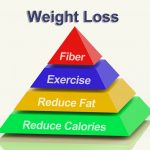I have seen firsthand the struggles that many individuals face when attempting to lose weight. Despite their best efforts, many people find themselves caught in a cycle of emotional eating, where they turn to food as a source of comfort or stress relief rather than fuel for their bodies.
This can lead to feelings of guilt and shame, which only perpetuate the cycle further. Breaking this cycle is crucial for sustainable weight loss and overall health.
In this article, we will discuss strategies for overcoming emotional eating and creating healthy habits that last. By focusing on both physical and emotional well-being, you can achieve your weight loss goals and maintain them long-term.
Understanding Emotional Eating And Its Impact On Weight Loss
 Emotional eating is a common issue that affects many individuals trying to achieve sustainable weight loss. It occurs when one turns to food for comfort or as a coping mechanism during times of stress, anxiety, or sadness.
Emotional eating is a common issue that affects many individuals trying to achieve sustainable weight loss. It occurs when one turns to food for comfort or as a coping mechanism during times of stress, anxiety, or sadness.
Although it may provide temporary relief, emotional eating can hinder progress toward weight loss goals and negatively impact overall health.
To address emotional eating, self-reflection is key. One must first identify the triggers that lead to overeating in order to develop healthy coping mechanisms. This involves being mindful and aware of emotions and thoughts surrounding food choices.
Additionally, seeking support from friends, family members, or healthcare professionals can be beneficial in overcoming emotional eating patterns.
It’s important to recognize that breaking the cycle of emotional eating takes time and patience. But with consistent effort and a willingness to seek help when needed, it is possible to overcome this obstacle on the journey towards achieving sustainable weight loss.
By understanding the impact of emotional eating and taking proactive steps towards change, individuals can improve their relationship with food and ultimately achieve long-term success.
Identifying Triggers And Developing Coping Mechanisms
As we delve deeper into breaking the cycle of emotional eating, it is essential to identify triggers that cause us to indulge in unhealthy food habits. Triggers can be anything from stress and anxiety to boredom or loneliness. Identifying these triggers is a crucial step towards developing coping mechanisms.
One effective way to identify your triggers is through journaling prompts. By writing down what you ate, how you felt before and after eating, and any emotions associated with the experience, you gain insight into your relationship with food. This process helps you recognize patterns and understand why certain foods have such a hold over you.
Having identified your triggers, the next step is developing coping mechanisms. Coping mechanisms are strategies that help you manage difficult emotions without resorting to emotional eating. It could be something as simple as going for a walk when feeling stressed or meditating when anxious.
Seeking professional support from therapists or nutritionists can also go a long way in providing personalized solutions tailored to individual needs. With consistent practice, these coping mechanisms become second nature, reducing the impulse to turn to food for comfort or distraction.
Journal Prompts:
- What did I eat today?
- How do I feel now compared to before I started eating?
- Did any specific event trigger my desire to eat?
Coping Mechanisms:
- Mindful breathing exercises
- Physical activity like walking or jogging
- Talking about feelings with friends/family/professional therapist
Seeking Professional Support:
- One-on-one therapy sessions
- Personalized nutrition plans created by registered dietitians
- Group counseling sessions – Group support meetings like Alcoholics Anonymous or Narcotics Anonymous.
Mindful Eating And Portion Control
Now that we have identified our triggers and developed coping mechanisms, it’s time to focus on mindful eating and portion control.
Mindful eating is the practice of paying attention to every aspect of your food, from its taste and texture to the emotions you feel while eating it. This helps us become more aware of what we are consuming and why.
Portion size awareness is also a crucial component of sustainable weight loss. It can be easy to overeat when we don’t pay attention to how much we’re putting on our plates or into our mouths. By using smaller plates, measuring out portions, and taking time between bites, we can train ourselves to eat mindfully and in appropriate amounts.
Another helpful strategy for mindful eating is incorporating all five senses into the experience. Take time to appreciate the aroma, appearance, and even sound of your meal before diving in. Chew slowly and savor each bite, noticing any sensations in your body as well.
These practices not only lead to healthier habits but also allow us to fully enjoy our meals without guilt or shame surrounding food choices.
Incorporating Regular Exercise And Activity
Regular exercise and physical activity are crucial components of any sustainable weight loss program. Engaging in regular workouts can help you burn calories, build strength, improve cardiovascular health, and boost your mood. However, many people struggle to stick with an exercise routine because they find it boring or don’t enjoy the types of activities they’re doing.
If you want to make exercise a consistent part of your life, it’s important to find fun workouts that you actually look forward to. Whether it’s dancing, hiking, swimming, or playing team sports, there are countless ways to get moving that can be enjoyable for different individuals. Experimenting with different activities until you discover what works best for you is key.
In addition to finding enjoyable forms of exercise, it’s also essential to balance cardio and strength training in your workout routine. Cardiovascular exercises like running or cycling can help raise your heart rate and burn more calories during each session. On the other hand, strength training exercises such as lifting weights or resistance bands can help build muscle mass which aids in increasing metabolism by burning more calories at rest.
By combining both aspects into one workout plan will ensure a well-rounded fitness regimen leading towards achieving long term success in weight management goals.
To sum up, incorporating regular exercise and activity is fundamental when aiming for sustainable weight loss. Finding fun workouts that cater specifically to individual interests while balancing cardio and strength training is integral for maintaining consistency throughout the journey. Remember that every little bit counts; even small amounts of daily movement add up over time!
Maintaining Motivation And Accountability
Let’s face it: maintaining motivation and accountability is tough. It can be especially difficult when you’re trying to break the cycle of emotional eating and sustain weight loss. That’s why having a support system in place, such as accountability partners, can make all the difference.
Accountability partners are individuals who provide encouragement, guidance, and feedback to help you stay on track with your goals. They could be friends or family members who share similar health aspirations or even a professional coach. By regularly checking in with them about your progress, you’ll feel more accountable for your actions and less likely to slip back into old habits.
Another effective strategy for staying motivated is implementing reward systems. As humans, we tend to respond well to incentives – so give yourself something positive to work towards!
Whether it’s treating yourself to a massage after hitting a milestone or buying that new workout outfit you’ve had your eye on, rewards can increase feelings of accomplishment and satisfaction. They also serve as a reminder that healthy behaviors are worth pursuing long-term.
In summary, maintaining motivation and accountability is key for sustainable weight loss. Consider enlisting the help of an accountability partner or creating a reward system to keep yourself on track and motivated towards achieving your goals. Remember that building healthier habits takes time but making small changes consistently will lead to big results over time.
What Are Some Alternative Coping Mechanisms To Emotional Eating?
I often come across clients who struggle with emotional eating. It is important to find alternative coping mechanisms to break this cycle and achieve sustainable weight loss.
Mindful meditation can be an effective way to manage emotions without turning to food. By focusing on the present moment and observing thoughts and feelings in a non-judgmental manner, individuals can learn to regulate their emotions without relying on food.
Another option is creative expression, such as art therapy or journaling. These activities allow individuals to express themselves in a healthy way and process their emotions without resorting to overeating.
Incorporating these practices into daily life can help break the cycle of emotional eating and promote long-term success in weight management efforts.
Can Emotional Eating Be Completely Eliminated, Or Is It A Lifelong Struggle?
Oh, the age-old question of whether emotional eating can be completely eliminated or is a lifelong struggle.
I must say that it’s quite ironic how we expect to eradicate something so deeply ingrained within us in just a few weeks or months.
However, with consistent therapy benefits and mindful eating techniques, it’s possible to gradually steer clear of emotional eating patterns.
The key here is not to aim for perfection but rather progress towards healthier habits.
It may take time, effort, and patience before seeing significant changes, but rest assured that every small step counts towards achieving sustainable weight loss.
How Can Social Support Help With Breaking The Cycle Of Emotional Eating?
Group therapy and mindfulness meditation are two effective strategies for breaking the cycle of emotional eating.
When it comes to managing emotional overeating, social support is crucial. Being a part of a supportive community can help individuals feel less isolated in their struggles, while also providing accountability and motivation.
Group therapy sessions provide a safe space for people to share their experiences with others who understand what they’re going through. Meanwhile, practicing mindfulness meditation has been shown to reduce stress levels and increase self-awareness, helping individuals better recognize when emotions are driving them to eat.
By incorporating these techniques into their daily routine, those struggling with emotional eating can begin to gain control over their habits and achieve sustainable weight loss.
Are There Certain Types Of Foods That Are More Likely To Trigger Emotional Eating?
Let’s dive into the topic of emotional eating triggers.
First off, it is important to note that this behavior can be different for everyone and varies based on individual experiences and preferences.
However, some common culprits include highly palatable or ‘comfort’ foods such as ice cream, chips, or pizza – often high in sugar, fat, and salt.
It’s not just about what we eat though; how we eat also plays a significant role.
Practicing mindful eating techniques and self-reflection can assist in identifying triggers and creating healthier habits around food consumption.
I encourage individuals struggling with emotional eating to explore their relationship with food through these methods while keeping an open mind towards progress rather than perfection.
Is It Possible To Lose Weight Without Addressing Emotional Eating Patterns?
While it is possible to lose weight without addressing emotional eating patterns, it may not be sustainable in the long term.
I highly recommend incorporating mindful eating practices and attending therapy sessions to address any underlying emotional issues that may contribute to unhealthy food choices.
Mindful eating encourages individuals to pay attention to their hunger cues and eat with intention rather than emotion.
Additionally, therapy sessions can help individuals identify triggers for emotional eating and develop healthy coping mechanisms.
By combining these strategies with a balanced diet and regular exercise, weight loss can become achievable and maintainable over time.
I understand the struggles of emotional eating and its impact on sustainable weight loss. However, it is possible to break this cycle by adopting alternative coping mechanisms such as meditation, exercise or talking with friends.
Although eliminating emotional eating may seem like an impossible task, taking small steps towards progress can make all the difference.
With the support of loved ones and a willingness to change old habits, individuals can overcome their challenges and achieve long-term success.
Remember that breaking free from emotional eating means embracing true freedom – freedom from negative emotions controlling our relationship with food.









